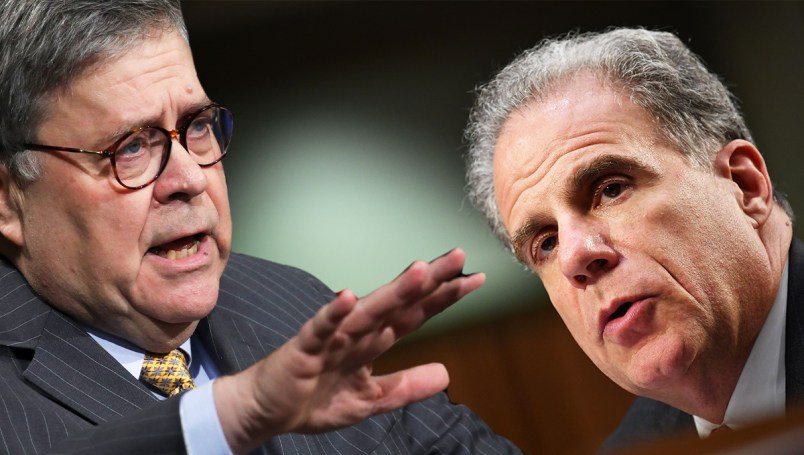Attorney General Bill Barr scrambled on Monday to keep a main anti-DOJ conspiracy theory going, after Justice Department Inspector General Michael Horowitz released a 476-page report finding that the FBI was justified in opening its Trump-Russia investigation.
Horowitz found that there was unanimous support within the Justice Department and FBI in July 2016 for opening an investigation into potential contacts between the Trump campaign and the Russian government, and found no evidence that anti-Trump bias played a role in the investigation’s start.
Rather, Horowitz found, “FBI officials involved in opening the investigation had reason to believe that Russia may have been connected to the Wikileaks disclosures that occurred earlier in July 2016, and were aware of information regarding Russia’s efforts to interfere with the 2016 U.S. elections.”
“We did not find documentary or testimonial evidence that political bias or improper motivation influenced the decisions to open the four individual investigations,” the report reads.
Horowitz opened his probe amid allegations from right-wing talking heads and politicos that partisan bias had propelled FBI officials into investigating the Trump campaign.
Trump himself had tweeted in March 2017 that President Obama had had the Trump campaign’s “wires tapped,” apparently referring to FISA warrants issued in the course of the probe.
The result of the whirlpool of allegations arrived in the form of the Horowitz report, which substantively rebutted the accusations and affirmatively found that FBI officials were justified in opening an investigation into Russia and the Trump campaign.
So, upon the report’s release, both Barr and Connecticut U.S. Attorney John Durham issued statements disagreeing with Horowitz’s finding.
“Based on the evidence collected to date, and while our investigation is ongoing, last month we advised the Inspector General that we do not agree with some of the report’s conclusions as to predication and how the FBI case was opened,” Durham said in his statement, adding that he was relying on evidence beyond the “component parts of the Justice Department.”
Durham is conducting a separate, criminal investigation into the origins of the Russia probe.
Barr and Durham’s statements, and Durham’s assertion of additional evidence, were striking. The DOJ watchdog interviewed all FBI officials involved in opening the probe, and found that each one “told us the information warranted opening a counterintelligence investigation.”
The FBI first became aware of potentially improper contacts between the Trump campaign and the Russian government on July 27. The day before, then-Australian ambassador to the UK Alexander Downer had told the U.S. Embassy in London about a drunken confession that Trump campaign foreign policy aide George Papadopoulos had made to him, in which he boasted to Downer that he had heard about supposed Russian help for the Trump campaign that would damage Hillary Clinton’s candidacy.
FBI officials in Washington spent three days — from July 28 to July 31 — discussing the merits of opening an investigation.
Various officials involved told the inspector general that they felt that “the FBI needed to investigate the allegation” that “there was a possibility that the Russians reached out to a campaign to offer their assistance.”
One FBI official told Horowitz that the probe was opened “upon the concern that the U.S. democratic process could be manipulated by a foreign power.”
Accordingly, the probe’s initial stated purpose was to find out “whether individual(s) associated with the Trump campaign are witting of and/or coordinating activities with the Government of Russia.”
The inspector general did find problems — but the vast majority of them were secondary to the opening of the investigation itself, and went instead to issues surrounding the content of FISA applications and whether FBI officials gave a full picture of the information available to them in the warrant applications. Much of these issues came up at moments where the probe ran into Christopher Steele and research firm Fusion GPS, earning criticism from the IG that remains separate from the substance of Barr’s critique.
It’s not clear what evidence Barr and Durham plan on offering to contradict Horowitz’s findings.
Much of the DOJ IG’s probe ended up focusing on an FBI official named Bill Priestap, who was in charge of the agency’s counterintelligence division during the 2016 presidential campaign.
It was Priestap who authorized the opening of the investigation, based on the aforementioned high-level discussions that culminated with the probe’s beginning on July 31.
Priestap told the DOJ watchdog that he felt the FBI was “obligated” to investigate, and that “he was not pressured to open the case.”
Priestap added to Horowitz’s team that the FBI decided against giving the Trump campaign a so-called “defensive briefing.” The lack of such a briefing has become a main talking point for the President’s allies, who have used it to suggest that the campaign was “set up” by the Obama administration.
But Priestap told the inspector general that he declined to brief the Trump campaign for fear of compromising the investigation.
“Had we provided a defensive briefing to someone on the Trump campaign, we would have alerted the campaign to what we were looking into, and, if someone on the campaign was engaged with the Russians, he/she would very likely change his/her tactics and/or otherwise seek to cover-up his/her activities, thereby preventing us from finding the truth,” Priestap said.
“On the other hand, if no one on the Trump campaign was working with the Russians, an investigation could prove that. Because the possibility existed that someone on the Trump campaign could have taken the Russians up on their offer, I thought it wise to open an investigation to look into the situation.”
But for Barr and Durham, the investigation has moved on. Durham’s report — and the potential results of his criminal investigation, set to play out in an election year — are next on the docket.






